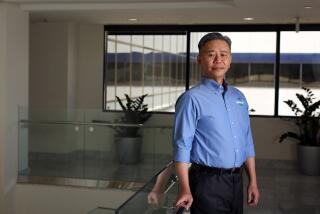Hong Kong Curbs at Forum Assailed
- Share via
HONG KONG — By the time the high-profile Fortune Global Forum conference of business leaders closed Thursday, it was clear the territory had escaped the unruly protests that dogged similar world trade meetings in Seattle, Prague, Melbourne and Quebec City.
Indeed, from the conference’s opening Tuesday, the issue in Hong Kong was the opposite: that authorities had acted too harshly, arbitrarily blocking entry to some who planned to protest outside the meeting hall and penning in so well those who did show up that forum participants hardly knew they were around.
Before the forum ended, the Hong Kong government found itself accused of throttling free speech and trampling the right of association. The U.S., British and Australian governments had called for the territory to explain its actions. And the limits of Hong Kong’s autonomy from Beijing were again under scrutiny.
Much of the anger centered on the decision by airport immigration authorities here to detain, then deport, foreigners known to be members of the Falun Gong spiritual movement--a quasi-religious group banned in mainland China. The group had planned to use Chinese President Jiang Zemin’s attendance at the forum to protest publicly--and peacefully--the alleged torture and killing of more than 200 followers in his nation.
Falun Gong spokespersons claimed that more than 100 supporters were deported, including at least seven Americans and several Britons and Australians.
Political analysts here saw the events as the latest attempt by leaders of this former British colony to feel their way along the largely uncharted political ground known as “one country, two systems”--the formula designed to preserve Hong Kong’s basic democratic freedoms under the sovereignty of an authoritarian state.
They argued that, behind the drama of airport deportations and unprecedented security arrangements, events of this week merely underscored two messages:
* Hong Kong’s leaders walk a very narrow path as they seek to protect the territory’s basic rights while staying within the limits of Beijing’s tolerance.
* Western business executives, when dazzled by the lure of China’s huge markets, tend to side with Beijing rather than defend democratic values.
As events unfolded this week, human rights advocates criticized overzealous control of protesters on the streets and Western governments cautioned Hong Kong’s authorities to avoid actions that could be seen as inconsistent with the territory’s freedoms. But executives organizing and attending the forum largely stayed quiet.
Tuesday evening, AOL Time Warner Chief Executive Officer Gerald M. Levin introduced the Chinese president to a dinner audience in conspicuously effusive terms as “my good friend Jiang Zemin” and “a man of honor, dedicated to the best interests of his people.”
Levin’s remarks came at a time when his company’s flagship magazine, Time, is banned in mainland China because of Beijing’s objections to its content, and on the day the U.S. government expressed concern about the apparently arbitrary use of procedures to deny Americans entry to Hong Kong.
Although Levin spoke only briefly and did not stake out political positions, the strongly deferential tone of his remarks seemed to carry its own message.
In a controversial March speech in Los Angeles, James Murdoch, heir to the News Corp. media empire, criticized the Falun Gong and suggested that democracy advocates in Hong Kong should accept the reality of life under the strong-willed Beijing government. Murdoch’s father, Rupert, once declared satellite television as the nightmare of totalitarian governments, only to yank the British Broadcasting Corp. off his Hong Kong-based Star TV network after its programming offended Beijing.
For Hong Kong’s leaders, pressures presented by the forum were especially intense. In January, the territory had hosted a convention of about 900 Falun Gong supporters without major incident, but this time both Jiang and 700 international corporate executives were in town and Falun Gong’s stated goal was to get the attention of both.
Analysts believe it was inevitable that authorities would err on the side of limiting protests. Hong Kong Chief Executive Tung Chee-hwa signaled as much late last month, accusing the Falun Gong of intending to “incite trouble in the relationship between Hong Kong and China.”
To ensure that the streets remained calm, authorities tightly corralled demonstrators in areas well out of sight of Jiang and conference participants. Some observers saw the action as indicative of how political dissent is handled now in Hong Kong: allowed but marginalized.
“The leaders in Beijing realize they have to tolerate people with other ideas, and they’ve come to accept that,” said Christine Loh, a respected political figure in Hong Kong. “But they see Falun Gong as an evil cult, and that can’t be ignored here either.”
Others note that even under British rule, Hong Kong authorities were careful not to anger Beijing.
While demonstrators were kept at bay, few other constraints on Hong Kong’s freedoms were visible. Media criticism of events was robust, Chief Secretary Donald Tsang was grilled at a news conference, and the police presence, while heavy, rarely seemed threatening.
“I don’t think we rolled over [to Beijing],” Loh said. “We have to tread a fine line in an area where our values are very different.”
More to Read
Sign up for Essential California
The most important California stories and recommendations in your inbox every morning.
You may occasionally receive promotional content from the Los Angeles Times.













